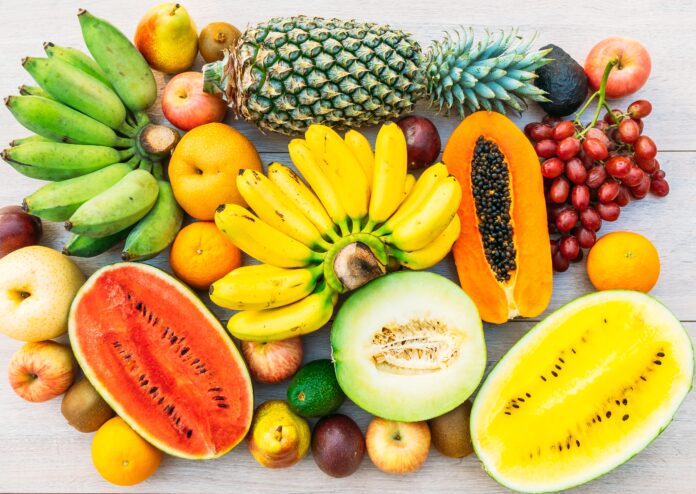Fruits, goldmines of vitamins, minerals and fiber are ideal to consume at least 4-5 servings in a day. Since they are in the natural form, account for largest part of water and 100% bad cholesterol free, it’s much easier for the body to process and absorb the vitamins and minerals from the fresh fruit.
Apple – Round fruit with lots of fibre, vitamins A, C, E and folate. Available in green, red or yellow skin when ripe. Apples reduce the risk of colon cancer, prostate cancer and lung cancer. They also help with heart disease, weight loss and controlling cholesterol.
Bananas – Long thick skinned fruit yellow in colour when ripe. Good source of fibre, potassium, vitamins A, C, B6, E & folate. Unripe or green bananas are used in cooking.
Cherries – small round fruit with a seed, red or black in colour when ripened. Cherries always have to be ripe to eat. Cherries contain anthocyanins that reduce pain & inflammation.
Figs – Eaten either dried or fresh, figs contain vitamin A, C, folate and niacin. A small sweet fruit full of small seeds.
Kiwi – A rich source of vitamins A, C, E, B – complex, calcium, iron and folic acid, kiwi is a small oval fruit with thin brown skin, soft green flesh and black seeds. The skin is a good source of flavonoid antioxidants.
Lime – Lime or lemon is the most cultivated citrus fruit with green to yellow colour loaded with vitamins A, C and folate. Juice of lime is good for detoxification and has antioxidant properties.
Peach – Round juicy fruit with a yellowish red skin & flesh having a taste of acidic tang and sweetness contains a rough stone. Always to be picked and eaten ripe.
Orange – A round thick-skinned juicy edible fruit that is a reddish-yellow colour when ripe with sweet to sour flavour. Peeled and eaten fresh or squeezed to make juice. Contain vitamin C, flavanoids, provides pectin and rich in sodium when ripened in sunshine.
Plum – soft round smooth-skinned fruit with sweet flesh and a flattish pointed stone. It is high in carbohydrates, low in fat and calories. An excellent source of vitamin A, C, calcium, magnesium, iron, potassium, fibre and free of sodium and cholesterol.
Papaya – A melon like fruit with yellow- orange flesh with dozens of small black seeds enclosed in skin that ranges in colour from green to orange. Either round, pear-shaped, or long like a banana. Rich in vitamins A, B, C, and D; calcium, phosphorous and iron. It is high in digestive properties and has a direct tonic effect on the stomach.
Pear – A sweet juicy yellow or green fruit with a rounded shape narrow towards the stalk. Best eaten at room temperature, pear contains kalium and riboflavine. It is good for skin and contains plenty of fibres.
Strawberry – A triangular shaped red colour fruit. It is one of the richest sources of Vitamin C and fibre. It has high content of sodium and iron. It helps in whitening of the teeth. Used to relieve rheumatism.
Watermelon – a type of melon with smooth exterior rind and juicy sweet red interior flesh. Extraordinarily refreshing to drink as juice or eaten when ripe and fresh. Valuable for minerals, vitamins and sugar with useful amount of fibre and iron.
About The Author: Sharon Hopkins manages websites on diet & nutrition.
Photo Credit: lifeforstock/freepik



































